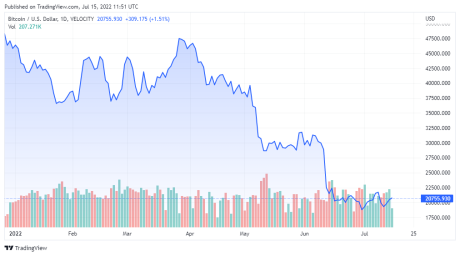Reason to trust

How Our News is Made
Strict editorial policy that focuses on accuracy, relevance, and impartiality
Ad discliamer
Morbi pretium leo et nisl aliquam mollis. Quisque arcu lorem, ultricies quis pellentesque nec, ullamcorper eu odio.
[vc_row][vc_column][vc_column_text]Are we in a bear market? Opinions vary, but it certainly feels like one. Markets across the board and across the world are in the red, and the bitcoin and crypto ones are no exception. If you’ve been paying attention, you know how all of this happened, but a refresher course wouldn’t hurt. Using ARK Invest’s latest Bitcoin Monthly report as a guide, let’s go through the tragic sequence of events and evaluate the bitcoin market as it stands.
According to ARK, the road to the bear market went like this:
“Beginning with the Terra collapse in early May, contagion spread to major crypto lenders including Blockfi, Celsius, Babel, Voyager, CoinFlex, contributing to the insolvency of the once highly-respected hedge fund, Three Arrows Capital (3AC). Since Terra’s collapse, total crypto market capitalization has dropped ~$640 billion.”
Nevertheless, there seems to be a light at the end of the tunnel. “Promisingly, however, recent fallout (Babel, Voyager, CoinFlex, Finblox) appears lower in magnitude compared to Terra, Celsius, and 3AC.” That doesn’t mean the end of the bear market is near, nor that capitulation is already over. Especially if the Mt. Gox victims receive the rumored 150K BTC.
First, let’s follow ARK as they analyze two of the main players in this drama. Then, let’s check the stats of the bitcoin market to see if we can find signs and clues that point out to the end of the capitulation stage. SPOILER ALERT: The jury is still out on that one. Some signs point to an early end, others to further downside. Aren’t bear markets fun?
Celsius And The Death Spiral
When Terra fell, the earth trembled. The Luna Foundation Guard sold nearly all of their 80K BTC reserve trying to defend the UST peg to the dollar. This event could’ve been the catalyst for the bear market. The worst was yet to come, though. Several once-respected institutions were heavily exposed to Terra through its Anchor protocol, and the UST collapse sent them all into a still ongoing death spiral.
According to ARK, “Celsius froze withdrawals on June 12th in response to significant outflows. Its DeFi debt outstanding is $631 million but the magnitude of its nonDeFi exposure is unclear.” There was still hope for its clients, as the company paid several loans. However, Celsius filed for Chapter 11 bankruptcy, leaving them all high and dry.
What really happens to the coins you deposit to reputable lending platforms. pic.twitter.com/RQh7jfrrNZ
— softsimon (@softsimon_) July 13, 2022
The Chief Commercial Officer at Choise.com, Andrey Diyakonov, analyzed the situation for NewsBTC:
“To put things into perspective, we need to turn it upside down, and ask, how much of the recent price action on the markets was influenced by or outright created by Celsius’ actions? What goes around always comes around. It’s so much more ironic given those credible reports that Celsius withdrawals were among those that sent UST and Terra position down the rabbit hole to find out where the bottom is.”
Our team covered that particular claim and the company’s response.
Three Arrows Capital And The Bear Market
Then, there was “Three Arrows Capital (3AC), a highly regarded crypto hedge fund reportedly managing $18 billion at its peak, appears to be insolvent after taking on too much leverage.” That’s according to ARK, who also says, “Seemingly, 3AC took on excess leverage to try and recover the losses. Its creditors included major players in the industry like Genesis, BlockFi, Voyager, and FTX.”
All of those companies except FTX seem to be counting down to extinction.

BTC price chart for 07/15/2022 on Velocity | Source: BTC/USD on TradingView.com
Is The Bear Market Just Beginning Or About To End?
Is the bottom in? Opinions vary. In a section titled “Market Contagion Sets Bitcoin Into Capitulation,” ARK analyzes all of the indicators and can’t reach a final conclusion. The numbers are extremely interesting, though.
- “Down 70% from its all-time high, bitcoin is trading at or below some of its most important levels: its 200-week moving average, the general cost basis of the market (realized price), the cost bases of long-term (LTH) and short-term holders (STH), and its 2017 peak.”
This “suggests extremely oversold conditions,” which is a great sign. However…
- “Historically, global bottoms occur when the MVRV of short-term holders exceeds the MVRV of long-term holders. That condition has not been met, suggesting the potential for more downside.”
The “condition has not been met,” but it’s close. Very close.
- “This month, miners generated revenues only 45% of that for the last twelve months, breaching a threshold that usually correlates with market bottoms.”
Miners who didn’t practice proper risk management have been selling at the present low levels. Miners who know what they’re doing will keep holding until we come out of the bear market. The question is, how many companies are in the first group and haven’t sold just yet?
- “Net realized losses in bitcoin recently reached a 2-year low, breaching 0.5% for only the fourth time since 2013.”
Historically, this suggests capitulation is over. Or is it?
- “Bitcoin’s net unrealized loss has hit a 3-year low, highlighting that its current market value is nearly 17% lower than that of its aggregate cost basis. Historically, global bottoms have formed when losses hit 25%+.”
If we’re going to reach 25%, that means there’s still a long way to go.
Is the bear market just beginning or about to end? The data is unclear. But capitulation seems to be nearing its end, which would be the first step in the right direction.
Featured Image by Marc-Olivier Jodoin on Unsplash | Charts by TradingView
[/vc_column_text][/vc_column][/vc_row]


















